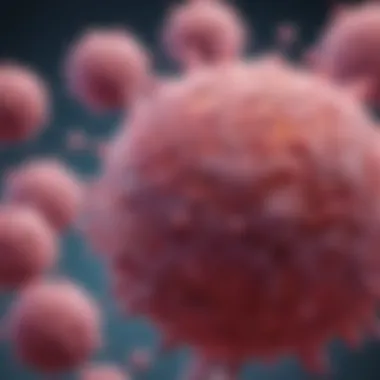Alcohol Consumption and Breast Cancer Recurrence: 2019 Insights


Intro
The interplay between alcohol consumption and breast cancer recurrence has gained considerable attention within the medical community. The understanding of how various factors influence cancer's return is crucial for both patients and healthcare providers. This complexity is underscored by the findings of multiple studies conducted in 2019. These investigations reveal noteworthy insights into not only how alcohol may affect breast cancer recurrence, but also the underlying biological mechanisms and implications for survivors.
Research Overview
Summary of Key Findings
In 2019, several studies shed light on the correlation between alcohol and breast cancer recurrence. A significant number indicated that even moderate alcohol consumption may elevate the risk of cancer returning. These findings draw attention to the need for a nuanced approach to dietary recommendations for breast cancer survivors.
Research highlights indicate that patients with a history of breast cancer should be cautious about alcohol intake, as it could have deleterious effects on their health.
Research Objectives and Hypotheses
The primary objectives of the 2019 research studies were to evaluate the relationship between alcohol consumption levels and breast cancer recurrence. Researchers hypothesized that higher levels of alcohol intake might correlate with increased risk. Furthermore, the research aimed to explore the biological pathways through which alcohol might influence tumor biology, potentially affecting hormone levels and, consequently, cancer recurrence.
Methodology
Study Design and Approach
The methodologies used in these pivotal studies varied but commonly included longitudinal cohort studies, case-control studies, and meta-analyses. By adopting such diverse approaches, researchers could derive a more comprehensive understanding of the issue. Participants included women previously diagnosed with breast cancer, closely monitored over several years to assess their alcohol consumption and the subsequent outcomes.
Data Collection Techniques
Data collection was meticulously conducted through validated questionnaires and patient interviews. Nutritional assessments were also performed to assess average alcohol intake. Medical records provided essential background information on participants’ cancer histories, allowing researchers to correlate recurrence events effectively with reported alcohol use.
As new data emerged from these studies, it became clear that the conversation surrounding alcohol consumption among survivors should be ongoing and guided by the latest scientific evidence. By analyzing such insights, patients and healthcare professionals can make informed decisions that align with their long-term health goals.
Foreword
Understanding the impact of alcohol on breast cancer recurrence is vital for numerous reasons. This topic not only holds significance for patients recovering from breast cancer but also sheds light on the broader implications for public health. In particular, breast cancer survivors often face the difficult choice of how to manage their alcohol intake post-diagnosis, as they navigate a complex landscape of health advice and personal choices. Evaluating the 2019 research findings provides important insights into these decisions.
Overview of Breast Cancer
Breast cancer remains one of the most diagnosed cancers among women worldwide, making it a significant health issue. In the context of this research, it’s essential to grasp how recurrence not only affects survival rates but also impacts the quality of life. Studies have shown that the emotional, physical, and psychological challenges associated with recurrence can be profound. Understanding these dynamics is crucial for developing effective support systems for a diverse range of patients.
Moreover, breast cancer encompasses various types, each with unique characteristics and treatment responses. This variability influences how patients respond to lifestyle factors, including alcohol consumption.
Understanding Alcohol Consumption Patterns
Alcohol consumption patterns vary significantly across different demographics and cultures. In 2019, researchers emphasized the need to prioritize patterns of drinking rather than just volume. Heavy or binge drinking poses different risks than moderate consumption. For breast cancer survivors, understanding these patterns is particularly important, as it directly affects recurrence risk.
Survivorship often brings with it new lifestyle choices. Some women may reduce alcohol intake, while others may not modify their drinking habits. This variability can lead to different health outcomes. Therefore, an informed understanding of ones consumption patterns relative to breast cancer risk factors is imperative.
Importance of the Study
The article aims to synthesize significant findings from 2019 that address the relationship between alcohol and breast cancer recurrence. Insights derived from this research provide clarity for patients, healthcare professionals, and researchers.
"Understanding the connection between lifestyle and health, particularly in the context of cancer survivorship, is crucial for informed decision-making."
Overall, this section sets the foundation necessary for an in-depth examination of the subsequent topics, ensuring that the reader is equipped with a fundamental grasp of the critical issues at play.
Alcohol and Cancer: A Pervasive Connection
Understanding the link between alcohol consumption and cancer, particularly breast cancer, is crucial for patients and healthcare providers. This section aims to clarify how alcohol may influence cancer dynamics. The pervasive nature of alcohol in society makes it an imperative topic for research. Its potential role in cancer initiation and progression raises vital questions regarding guidelines and individual choices.
Epidemiological Evidence


Epidemiological studies consistently show a connection between alcohol consumption and an increased risk of breast cancer. Research indicates that even moderate drinking can relate to elevated breast cancer rates. For instance, extensive analyses suggest that women who consume one drink per day carry a modestly higher risk compared to non-drinkers. The Global Burden of Disease study highlighted alcohol as a significant factor in global cancer cases.
Key statistics reveal:
- About 13% of breast cancer cases are tied to alcohol consumption.
- The risk intensifies with the amount consumed, supporting the notion that higher intake equates to greater risk.
These findings underscore the importance of considering alcohol as a preventable risk factor in breast cancer. Various cohort studies affirm this relationship, linking intake levels to recurrence rates in survivors.
Potential Biological Mechanisms
Understanding how alcohol impacts cancer biology is essential. When consumed, ethanol in alcoholic beverages is metabolized into acetaldehyde, a compound that can damage DNA. This process may lead to mutations in genes crucial for cancer suppression. Moreover, alcohol consumption can disrupt hormone levels, particularly estrogen, which plays a significant role in breast cancer. Elevated estrogen levels can stimulate breast tissue proliferation, thus increasing the likelihood of malignant transformations.
Additionally, the presence of free radicals from alcohol metabolism can lead to oxidative stress, further contributing to cellular damage and tumorigenesis. These mechanisms provide a biological basis for the epidemiological data observed.
Influence of Genetic Factors
Genetic predispositions also play a significant role in how alcohol affects breast cancer risk. Certain genetic variants can intensify the effects of alcohol on breast cancer risk, while others may mitigate them. For example, variations in genes related to alcohol metabolism can affect an individual's sensitivity to alcohol's carcinogenic properties. Specific gene polymorphisms, like those found in the ADB gene, can accelerate the breakdown of alcohol, thereby potentially reducing the risk of cancer among heavy drinkers.
Furthermore, polymorphisms in genes such as BRCA1 and BRCA2 have been implicated in both alcohol metabolism and breast cancer risk. Understanding these interactions is crucial for crafting personalized recommendations for alcohol consumption in patients at risk.
"The interplay between alcohol, genetics, and breast cancer underscores the need for more targeted research in this area."
Study Findings from
The exploration of the connection between alcohol consumption and breast cancer recurrence is crucial, particularly when considering the significant health implications involved. The research findings from 2019 provided a wealth of information that deepens our understanding of how alcohol may impact cancer outcomes. This section delves into key studies that illuminate these relationships, focusing on specifics that matter to breast cancer survivors, healthcare professionals, and researchers alike.
Research Overview
In 2019, several pivotal studies addressed the recurring concern about alcohol and its links to breast cancer recurrence. These investigations aimed at understanding how varying levels of alcohol consumption could influence tumor behavior and patient prognoses. Researchers examined data from diverse populations, aiming to establish a comprehensive picture of these links. The focus was not solely on recurrence rates but also on how alcohol type, quantity, and frequency could differentially affect patient outcomes. This holistic approach offered a nuanced view that is critical for future guidelines.
Key Outcomes and Statistics
The findings from 2019 revealed striking correlations between alcohol intake and the risk of breast cancer recurrence. Several notable statistics emerged:
- Studies suggested that women who consumed more than one drink per day had a significantly higher risk of recurrence compared to non-drinkers.
- Specific studies indicated that moderate drinkers also faced increased recurrence risks, particularly when consuming certain types of alcohol like wine and spirits.
- Noteworthy data showed that approximately 20% of breast cancer survivors reported regular alcohol consumption post-treatment, emphasizing a need for clear guidelines.
"Understanding the statistical relationships between alcohol and cancer recurrence can shape prevention strategies and enhance patient education."
These key outcomes highlight the urgency in framing recommendations for breast cancer survivors regarding alcohol consumption.
Comparative Analysis with Previous Years
Comparative analysis with earlier studies indicated a progressive understanding in the field. In previous years, the evidence linking alcohol to breast cancer outcomes was often inconsistent. However, the 2019 findings marked a turning point. They solidified much of the earlier speculation with clearer correlations.
- Earlier research tended to focus primarily on initial diagnosis and treatment, paying less attention to long-term alcohol use.
- The 2019 studies incorporated more comprehensive data, providing insights that were lacking in past analyses.
- Many 2019 studies also utilized more advanced statistical models, increasing the reliability of their findings compared to those from years prior.
This evolution in research focus underscores the necessity for ongoing studies and updates in clinical practices as new evidence emerges.
Quantifying Alcohol's Role in Recurrence
Understanding the role of alcohol consumption in breast cancer recurrence is essential for patients and healthcare providers alike. As research evolves, clearer insights emerge about how different levels of alcohol intake can affect the prognosis for survivors. Accurately quantifying alcohol's influence can guide recommendations and inform personal choices, ultimately affecting recovery outcomes.
Defining Moderate vs. Heavy Consumption
Defining what constitutes moderate and heavy alcohol consumption is critical in this context. Moderate drinking is often considered up to one standard drink per day for women and up to two for men. A standard drink typically contains about 14 grams of pure alcohol. Examples include:
- 12 oz of beer (about 5% alcohol content)
- 5 oz of wine (about 12% alcohol content)
- 1.5 oz of distilled spirits (about 40% alcohol content)
Heavy consumption, conversely, generally refers to more than three drinks a day for women and four for men, leading to increased health risks. Notably, frequent heavy drinkers may experience different biological effects that could heighten cancer recurrence risks. Understanding these distinctions can assist patients in making informed decisions.


Statistical Correlations in Recent Studies
Recent studies have shown varied statistical correlations between alcohol intake levels and breast cancer recurrence. For instance, the 2019 research highlighted clear links between heavy drinking and increased recurrence rates among breast cancer survivors.
"Moderate alcohol consumption may not pose the same risks as heavy drinking; however, there is still an ongoing debate regarding the effects of low-level alcohol intake on cancer return."
Some key findings include:
- Increased Risk: Women consuming more than three alcoholic drinks per week showed a higher percentage of recurrence compared to those who consumed less.
- Dose-Response Relationship: Higher levels of alcohol correlated with more significant recurrence rates, indicating a dose-response relationship that can inform patient guidelines.
- Sociodemographic Factors: Age, ethnicity, and overall health status can influence these outcomes, suggesting that a more holistic approach to understanding alcohol's impact is necessary.
In summary, quantifying alcohol's role in breast cancer recurrence is a delicate yet vital topic. Recognizing the differences between moderate and heavy consumption helps articulate risks for survivors. Additionally, recent studies have illuminated the impact of various consumption levels on recurrence, underscoring the need for precise guidelines tailored to individual patient profiles.
Guidelines for Breast Cancer Survivors
When it comes to breast cancer recurrence, navigating alcohol consumption can be complex. Guidelines for breast cancer survivors are crucial in providing actionable advice. These guidelines illuminate avenues for reducing risks associated with recurrence, fostering informed decision-making. As research shows a potential link between alcohol intake and cancer outcomes, survivors must understand how to incorporate these guidelines into their lifestyle.
Clear guidelines allow survivors to make choices relevant to their health, including decisions on alcohol consumption. Different health organizations emphasize varying recommendations, which can be confusing. A well-structured guideline synthesizes these recommendations into a format that patients can easily access and understand, contributing to their overall sense of control over their health.
For many survivors, understanding how much wine or beer is considered moderate can be critical. Knowledge empowers patients, allowing them to assess their behaviors critically. Furthermore, emotional and social contexts shouldn't be overlooked; interactions involving alcohol often occur in social settings. Therefore, awareness of how these social dynamics play out can enhance understanding and stewardship of one’s health.
Current Recommendations from Health Authorities
Health authorities, such as the American Cancer Society, assert specific recommendations on alcohol consumption for breast cancer survivors. Generally, moderate alcohol intake is defined as up to one drink per day for women. This definition helps outline acceptable levels without compromising health. However, it's crucial to note that some studies suggest even lower levels of consumption may be advisable for this specific population.
Among the evidence presented, one effective approach is to consider the overall dietary habits. A balanced diet, rich in fruits and vegetables alongside limited alcohol consumption, further enhances the body’s ability to cope with potential recurrent cancer risks.
Additionally, these recommendations often involve personalized assessment based on a patient’s history and circumstances. Such insights are invaluable in forming a holistic view of lifestyle interventions.
Role of Healthcare Providers
Healthcare providers hold a pivotal position in guiding breast cancer survivors through their dietary choices, including alcohol intake. Physicians and oncology dietitians are vital sources of support and information. They play a key role in reinforcing the guidelines set forth by health authorities, tailoring advice to individual situations. This personalized approach enhances the relevance of information shared.
Providers may initiate discussions about alcohol consumption during follow-up visits and are tasked to address concerns directly related to health risks. Beyond merely repeating guidelines, they can offer strategies for mindful drinking, emphasizing moderation while acknowledging cultural or social aspects associated with alcohol consumption.
Moreover, empowering patients through education about their risks fosters a proactive mindset. When patients feel informed, they are more likely to engage in discussions and adhere to suggested guidelines, ultimately improving their health outcomes.
"Effective management of lifestyle choices, such as alcohol consumption, can significantly influence the overall health of breast cancer survivors."
Controversies and Debates
The relationship between alcohol consumption and breast cancer recurrence invites a mosaic of opinions, research findings, and experiences. It is vital to explore this component because understanding these controversies is essential for survivors, health professionals, and policy-makers. Many individuals have varying beliefs regarding alcohol's role in cancer risk. This debate can influence personal choices about drinking, health care recommendations, and public health policies. By examining contrasting views, stakeholders can equip themselves with necessary information to navigate this complex landscape.
Differing Perspectives on Alcohol Consumption
Conflicting views often emerge in discussions surrounding alcohol and breast cancer. Many studies indicate a positive correlation between alcohol consumption and breast cancer recurrence. In contrast, some argue that moderate consumption might not significantly affect overall risk. This disparity arises from differences in study designs, populations, or how alcohol consumption is quantified.
- Some experts argue that light drinking may have minimal impact, especially in the absence of other risk factors.
- On the other hand, there is a strong sentiment among oncology specialists that even small amounts of alcohol could exacerbate risks associated with hormone receptor-positive breast cancers.
These conflicting perspectives require careful consideration, particularly when individuals weigh lifestyle choices that could impact their health. To compound the situation, socio-cultural factors and personal beliefs about moderation also come into play. This creates a complicated dialogue that invites further inquiry and nuanced understanding.
Impact of Confounding Variables
In research, confounding variables present considerable challenges in establishing clear cause-and-effect relationships. In studies assessing alcohol’s role in breast cancer recurrence, various factors must be accounted for.
- Genetic predisposition: Certain genetic markers can influence how the body processes alcohol, potentially heightening cancer risks.
- Lifestyle choices: Smoking, diet, physical activity, and other lifestyle factors frequently overlap with drinking habits, complicating findings.
- Healthcare access and quality: Variability in access to screenings or treatments could inform rates of cancer recurrence, independent from alcohol use.
Identifying these confounding variables is important to understand better the complexities involved in alcohol consumption studies.
Acknowledging these factors can help researchers design more robust studies in the future to provide clearer conclusions.


Patient-Centric Considerations
In addressing the impact of alcohol on breast cancer recurrence, it is essential to focus on patient-centric considerations. This approach centers the experiences and needs of individuals who have faced breast cancer. It allows for a more nuanced understanding of how alcohol consumption can affect not just their physical health but also their mental and emotional well-being.
Psychological Effects of Alcohol and Cancer
Patients often confront a complex interplay between their mental health and cancer treatment. Alcohol consumption may become a coping mechanism for some, particularly in dealing with the stress and anxiety associated with cancer recurrence. Understandably, the psychological burden of cancer can lead individuals to seek solace in familiar habits. However, studies indicate that alcohol can exacerbate feelings of depression and anxiety, potentially undermining recovery efforts.
Research points to a higher rate of alcohol dependency among cancer patients, partly as a way to mitigate the fears of recurrence or manage the emotional fallout from diagnosis. This creates a paradox: while alcohol may provide temporary respite, it may simultaneously pose risks to long-term health outcomes. Patients should be aware of these psychological effects when making decisions about alcohol consumption, emphasizing the importance of mental health support in conjunction with physical health assessments.
Support Systems and Their Role
Support systems play a crucial role in helping breast cancer survivors navigate their relationship with alcohol. Family, friends, and healthcare professionals can provide encouragement and resources that foster healthier lifestyle choices. Creating a network of support can help address both the psychological and social dimensions of alcohol use.
Effective support systems may include:
- Emotional Support: Providing a safe space for patients to express their feelings and concerns about alcohol use and cancer recurrence.
- Education: Offering information about the risks associated with alcohol consumption post-treatment and how it may affect health outcomes.
- Counseling Services: Encouraging patients to engage with mental health professionals specializing in cancer recovery, who can provide strategies for coping without reliance on alcohol.
Engaging with these support systems not only aids in mental resilience but also encourages adherence to health guidelines tailored for breast cancer survivors.
"Support systems can significantly shape a patient's experience, making the journey more manageable and less isolating.”
Future Research Directions
Future research in the area of alcohol consumption and breast cancer recurrence is essential for several reasons. Firstly, while the 2019 studies have shed light on this relationship, there remain numerous questions that require further exploration. Identifying these research gaps is critical in developing a more comprehensive understanding of how alcohol influences the course of breast cancer in survivors. Additionally, advancements in methodologies are necessary to better assess the long-term impact of alcohol use on patient outcomes.
Another important aspect is the need for longitudinal studies. These types of studies can provide insights into how alcohol consumption patterns evolve over time and may correlate with cancer recurrence rates. By observing patients over extended periods, researchers can gather data that reflects real-world scenarios, offering a clearer picture of alcohol’s effects and the potential mechanisms at play.
Continuing research on this topic is not just beneficial but necessary for patients, caregivers, and healthcare professionals. Improved understanding can lead to enhanced treatment protocols, patient education, and possible policy changes regarding alcohol consumption recommendations for breast cancer survivors.
Identifying Research Gaps
It is vital to pinpoint specific areas where research is lacking. For example, much of the focus so far has been on average alcohol intake. However, there is a need for studies that explore more nuanced patterns of consumption, such as binge drinking compared to regular moderate drinking. Investigating these differences might provide clearer guidelines for survivors.
Other gaps include the need to analyze the effects of different types of alcoholic beverages. Do certain drinks, like wine versus spirits, carry varying risks? Addressing this could significantly influence survivor recommendations. Furthermore, exploring the combined influence of other lifestyle factors, such as diet and exercise, alongside alcohol consumption will help to decipher their collective impact on health outcomes.
"Identifying gaps in current research helps pave the way for future investigations, making it possible to create tailored health guidelines for breast cancer survivors."
Longitudinal Studies and Emerging Trends
Longitudinal studies are especially important as they allow researchers to track changes over time. These studies differ from cross-sectional investigations, which provide a snapshot of data at a single point in time. Tracking patients as they progress through their treatment and recovery phases can reveal trends that are not visible in shorter studies.
Emerging trends in this field may also influence future research directions. Advances in technology, including the use of mobile health applications to track alcohol consumption, could aid in gathering real-time data. This data can then be analyzed alongside patient health outcomes, yielding insights that were previously hard to obtain.
Additionally, examining broader societal trends, such as changes in alcohol consumption behaviors and attitudes, could highlight relevant public health issues. Understanding how these shifts impact breast cancer survivors may directly influence health communication strategies and patient support mechanisms.
Finale
The conclusion of this article plays a vital role in synthesizing the findings related to alcohol's impact on breast cancer recurrence. It summarizes essential insights drawn from studies conducted in 2019, offering clarity to a topic of significant concern among patients, healthcare providers, and policymakers. The intricate relationship between alcohol consumption and cancer recurrence necessitates a nuanced understanding. This section emphasizes how various levels of alcohol intake might correlate with health outcomes for breast cancer survivors.
Summarizing Key Findings
The key findings from recent research illustrate a concerning link between alcohol consumption and breast cancer recurrence. Studies indicate that:
- Increased Risk: Regular intake of alcoholic beverages is associated with a heightened risk of recurrence.
- Moderate vs. Heavy Consumption: Distinct differences exist between moderate and heavy consumption patterns, with heavy drinkers facing significantly greater risks.
- Biological Mechanisms: Potential pathways include hormonal changes and genetic factors that may mediate the influence of alcohol on cancer cells.
These findings underscore the importance of individual lifestyle choices in the context of health management for breast cancer survivors.
Implications for Practice and Policy
The implications of these findings are critical for practice and policy. Healthcare systems should consider:
- Guidelines Revision: Current recommendations for alcohol consumption among breast cancer survivors may need to be reevaluated in light of new evidence.
- Patient Education: Increased awareness programs about the risks associated with alcohol consumption can empower patients to make informed decisions about their health.
- Interdisciplinary Collaboration: Involving oncologists, nutritionists, and psychologists can provide comprehensive care addressing both physical and psychological aspects of recovery.
These considerations are paramount in molding effective public health policies and enhancing the quality of life for individuals affected by breast cancer.













